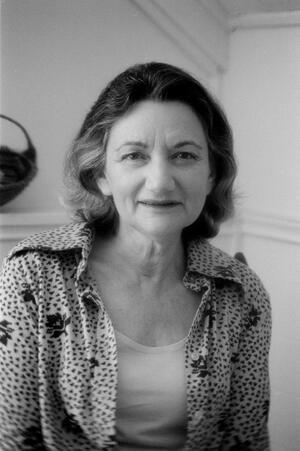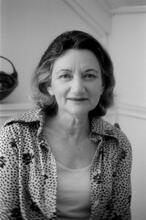Helen Yglesias
Writer Helen Yglesias explored the lives of New York Jewish women in her distinctive books. Born in 1915, she was the youngest of seven children to two Jewish immigrants and was raised in Brooklyn, NY. Inspired by her travels and the books that she had read, Yglesias joined the staff of The Nation as an editor before shifting her career to become a writer in 1972. She went on to write moving works that focused on the morals of the Jewish past and concerns for justice and dignity in the Jewish community.
Twice married, once divorced, mother of three and a grandmother, very much the wife of my husband, a distinguished writer, whose person entirely filled the landscape of my emotions, I, born poor and without an easy entrance into the world where I coveted a place, I had crawled somehow, into a little corner.
In Starting: Early, Anew, Over and Late (1978), Helen Yglesias recollects her own life and presents the lives of others in terms of renewal. In the process, she describes those circumstances that lead to self-definition. Yglesias discovered that her own nature was buried, and that only a transformation of her life would allow her to become a novelist. Similarly, a process of self-recognition leads her protagonists, all of them women, to accept responsibility for their lives and values.
Family and Personal Life
Although she lived her later life in Maine, Yglesias was very much a daughter of New York. She was born in New York on March 29, 1915, the youngest of seven children. Her parents, Solomon and Kate (Goldstein) Bassine, had left Russia and Russia-Poland respectively, spent several years in England, and came to America. Solomon Bassine, a grocer in America, was not a success and the Bassine children were numerous: in birth order, Harry, Minnie, Cecile, Charles, Louis, Rose, and Helen. In “A Way In and a Way Out,” Yglesias remembers her parents and siblings living in a cold-water, four-room tenement in Brooklyn. At the age of sixteen, she graduated from James Monroe High School in the Bronx and thought that writing a novel would help lift her parents out of poverty. However, one of her brothers humiliated her efforts and she destroyed her manuscript. When she was seventeen, this same brother, who later became a prominent businessman and philanthropist, paid her way for a trip to Europe and Palestine. An avid reader, she was soon introduced to the works of D.H. Lawrence, William Faulkner, Gertrude Stein, and Marcel Proust. Working in nondescript jobs, she also began to read Henry James while at the New York Public Library. Yglesias became a member of the Young Communist League in 1936. (She left the Communist Party in 1952.) In 1937, she married Bernard Cole. The couple had two children, Tamar and Lewis. In the 1940s, she reviewed books and for a short time helped edit the cultural section of The Daily Worker. She also became a member of the Newspaper Guild. In 1950, she and Cole divorced, and that year she married José Yglesias. They had one child, Rafael. They divorced in 1992.
Literary Career
In 1965, Helen Yglesias joined the staff of The Nation and shortly thereafter became its literary editor. At age fifty-four, she left her job to dedicate herself to becoming a writer. How She Died, her first novel, was published in 1972. This book was followed by Family Feeling (1976), Starting: Early, Anew, Over, and Late (1978), Sweetsir (1981), The Saviors (1987), Isabel Bishop (1989) and The Girls (1999), which Yglesias called “a feminist novel about aging.”
Except for in Sweetsir, her protagonists come from the variable Jewish life of New York. Yglesias binds their private lives to their public environment, for these women are assimilated but concerned with utilizing the morals of the Jewish past and its prophetic ethic—a concern for justice and dignity. Moreover, her main characters concern themselves with the civic education of those around them—family members as well as a larger public. They gain their autonomy as they reassess the mores and politics that prevent them from understanding and acting upon their environment. Yglesias’s realism makes a distinctive contribution to American Jewish writing.
Selected Works
Family Feeling. New York: Dial Press, 1976.
The Girls. Harrison, New York: Delphinium, 1999.
How She Died. Boston: Houghton Mifflin, 1972.
“Invoking America: A Gitche Gumee Memoir.” NYTimes Book Review, July 5, 1987, 1: 22;
Isabel Bishop. New York: Rizzoli, 1989.
The Saviors. Boston: Houghton Mifflin, 1987.
Starting: Early, Anew, Over, and Late. New York: Rawson Wade, 1978.
Sweetsir. New York: Simon and Shuster, 1981.
“A Way In and a Way Out.” New York Times Book Review, June 14, 1981: 3: 24–25.
Avery, Evelyn. “Oh My ‘Mishpocha’! Some Jewish Women Writers From Antin to Kaplan View the Family.” Studies in American Jewish Literature 5 (1986): 44–53.
Brown, Rosellen. “Breaking the Circle of Destructive Love.” NYTimes Book Review, April 5, 1981, 3: 28–29.
Bunge, Nancy. “Helen Yglesias.” Finding the Words: Conversations with Writers Who Teach (1985).
Chevigny, Bell Gale. Review of Family Feeling. New Republic 174 (May 8, 1976): 27–29.
Fried, Lewis. “Helen Yglesias.” Jewish American Women Writers: A Bio-Bibliographical and Critical Sourcebook, edited by Ann Shapiro et al. (1994).
Haynes, Muriel. Review of How She Died. Saturday Review 55 (March 18, 1972): 74–75.
Kapelovitz, Abbey Poze. “Mother Images in American-Jewish Fiction.” Ph. D. diss., University of Denver, 1985.
“Author Interview.” Reading Group Guides (2000).
Ryan, Bryan. “Yglesias, Helen.” Contemporary Authors, edited by Linda Metzger, New Revision Series, vol. 15 (1985): 471–474.




